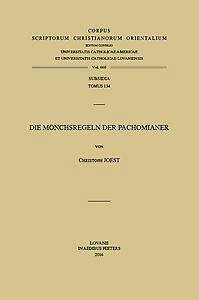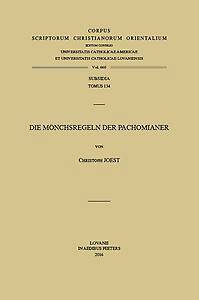
- Retrait gratuit dans votre magasin Club
- 7.000.000 titres dans notre catalogue
- Payer en toute sécurité
- Toujours un magasin près de chez vous
- Retrait gratuit dans votre magasin Club
- 7.000.0000 titres dans notre catalogue
- Payer en toute sécurité
- Toujours un magasin près de chez vous
Description
English summary: The monastic rules attributed to St. Pachomius have only been transmitted in their complete form in the Latin translations produced by Jerome. A German translation of this collection of rules has been available for a long time, thanks to the published edition of H Bacht, but C. Joest presents for the first time a German translation of the rules with careful examination of the Coptic parts of the text, which are also presented here in German. This comparative textual and linguistic analysis offers valuable information concerning the transmission and receptions that the rules had on the development of religious ideas as well as the development of Christian monasticism. This collection of rules is rightly associated with Pachomius because they were originally produced or inspired by him and were not dependent on received or authorial traditions. The rules arose from the attempt to resolve issues related to the practical matters of daily life and they are only sensible in the context of a living structure of authority. The written rules were wholly embedded within an oral culture, which shaped their interpretation and implementation. Whether Pachomius himself wrote the rules or whether he dictated the rules to another monk who later wrote them is unclear from the existing sources. It is clear, however, that the material concerning the style and content of the rules, in one way or another, extends back to Pachomius. As far as their establishment as monastic "legislation," the rules were first commended by the successors of Pachomius, who consistently recommended them to their confreres as the "orders" and "commandments" of the founder of the monastic community. These regulations were perpetuated in part because of the authority of the "father," who had commended them to his followers but no longer served as a living example for his fellow monks not could be posthumously consulted on their meaning and execution. Pachomius' rule, therefore, achieved the status of a canonical writing concerning the monastic life. German description: Die Pachomianer-Regeln sind uns vollstandig nur auf Latein in der sbersetzung des Hieronymus uberliefert. Nachdem H. Bacht schon vor langerer Zeit den lateinischen Text in deutscher sbersetzung publiziert hatte, werden sie hier estmals auch unter Berucksichtigung der koptischen Regelteile auf Deutsch veroffentlicht und eingehend analysiert. Dabei werden auch die Forschungsgeschichte und die Wirkungsgeschichte ausfuhrlich dargestellt. Das Regelganze ist zu Recht mit Pachoms Namen verbunden, es ist seine originale Schopfung und inspiriert von seinem Geist. Aber es verdankt sich nicht einem bewussten literarisch-schriftstellerischen Prozess. Die Regeln sind aus dem praktischen taglichen Leben hervorgegangen, und sie sind auch nur in Rahmen einer lebendigen Autoritatsstruktur sinnvoll. Sie sind noch ganz in die Kultur der Mundlichkeit eingebettet, in der sie ihre Interpretation und ihre Anwendung fanden. Ob Pachom die Regeln personlich geschrieben hat, ob er sie diktiert oder ob ein Bruder die mundlich erlassenen Regeln spater aufgeschrieben hat, ist nicht mehr zu entscheiden. Deutlich ist aber, dass das Regelmaterial nach Stil und Inhalt auf die eine oder andere Weise auf ihn selbst zuruckzufuhren ist. Zur 'Gesetzgebung' wurden die Regeln erst durch den Ruckgriff der Nachfolger Pachoms, die ihre Mitbruder bestandig auf die 'Anordnungen' und 'Gebote' des Ordensgrunders verpflichteten. Diese Ordnungen lebten zwar immer noch von der Autoritat des 'Vaters', der sie erlassen hatte, der aber nicht mehr als lebendes Beispiel unter ihnen war, sondern nur noch posthum beschworen werden konnte. Dadurch erst bekamen seine Regeln gewissermaaen einen kanonischen Rang.
Spécifications
Parties prenantes
- Auteur(s) :
- Editeur:
Contenu
- Nombre de pages :
- 322
- Langue:
- Allemand
- Collection :
- Tome:
- n° 660
Caractéristiques
- EAN:
- 9789042932937
- Date de parution :
- 26-01-16
- Format:
- Livre broché
- Format numérique:
- Trade paperback (VS)
- Poids :
- 530 g

Les avis
Nous publions uniquement les avis qui respectent les conditions requises. Consultez nos conditions pour les avis.






